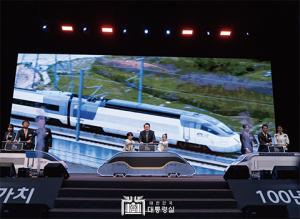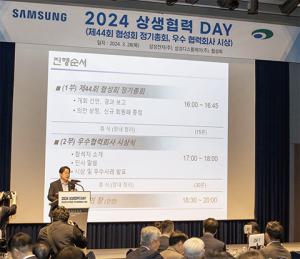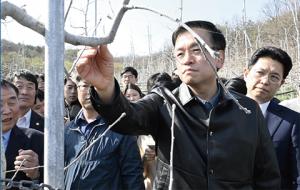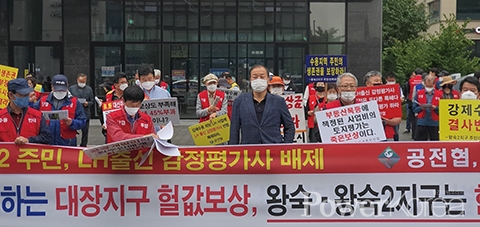 |
||
Land Owners and Residents Solidarity for Public Housing Development set sail for the houses in the redevelopment areas whose owners do not receive reasonable compensation from the government. As the president elect Yoon pledged to make changes to the current public housing development and supply policy, the Solidarity is urging the new government to revise the current land compensation system from the beginning. Chaegwan Im, the president of the Solidarity, issued a statement and delivered it to the Yoon’s transition team on behalf of the 82 branches of the Solidarity nationwide and 1 million members. The statement demanded 1) reorganize the current public housing headquarters to people’s housing headquarters 2) change the head of the Central Expropriation Committee to a public official in political service from the current Minister of Land, Infrastructure and Transport 3) stop the large scale monopoly housing development 4) abolish forcible purchase system 5) revise the related laws on which affected owners of the houses have legal rights to share the profits of redevelopment 6) exemption of transfer income tax imposed on forcibly obtained land. The Solidarity specified on the statement that the development profits must be shared by the property owners and the project operators but not monopolized by the government alone.
Example 1: SK Semiconductor Cluster
Gyechul Kim, Fighting Division Head of the Resident’s Emergency Committee for SK Semiconductor Cluster Project in Wonsammyeon Yongin complains “The project has been in a halt for 3 years. The reason is that despite it is a private project, the conglomerate is trying to buy the lands half the current market value. They actually have agreed a deal with us on September 7, 2021 but they do not seem to keep the promise. They also agreed with the government on this but they are leaking different stories to the media. What is more? They have never held a public hearing or a meeting regarding how they discharge the wasted water but decided themselves to discharge through a round of the villages from Dokseongri to Wonsam Elementary School to Godangri. Environmental issues are a hot topic now but they have not even received an environment affects evaluation yet. The special favor to SK doesn’t seem to end here: they seem to buy greeneries in urban areas which is nothing to do with the cluster and develop it into 1,826 houses and commercial stores to make huge profits alone. If Yongin City allows this, we cannot help but the city gives special favor to the conglomerate.
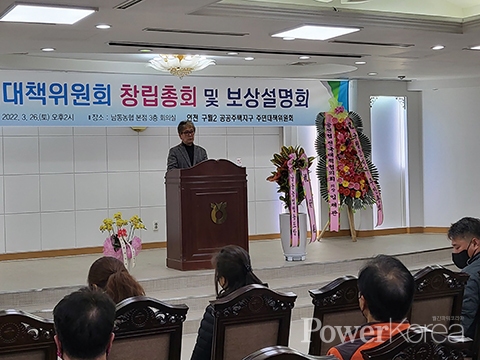 |
Example 2: Incheon Guwol 2 Dong Public Housing Development
Wanggyun Oh, Head of the Resident’s Committee for Guwol 2 Dong Public Housing Development Incheon, complains “According to a strategic environmental assessment, the area is where natural monuments and endangered species habitate. In other words, the development will bring devastation to this ecology. The development plan not only has environmental issues but it also does not stimulate the economy of the old town in the area. Guwoldong in fact is the lungs of Incheon and the city adopted a slogan of ‘environment-friendly city’. In other words, the development is against this slogan. Lifting the green belt and decreasing the housing price by building more houses in the area for me is not seem to be plausible. I think ‘the supply to lower housing price policy’ has been proved itself not working already. Therefore, I ask the city whether the government plan to lower housing price in Seoul by building more houses in Incheon will work things out as it planned. So I strongly show my feeling of objection to it. Rather, I think it is more plausible that they supply houses designed to meet increasing demand for single or couple households which will become the main consumer group of the housing market after 10 years alongside urban regeneration projects. Expropriation is the method when the government was hunger for budget in the past but in this time of 2022 where South Korea ranks 10th economy in the world, it is time we threw it away for new.”
Example 3: Wangsook 2 Area
Hwanyeol Yong, Head of the Residents Committee for Wangsook 2 Area Public Housing Development, pointed out transfer tax, relocation of residents, means of living and the resource circulation complex as things to take into consideration. “The appraiser, for example, appraises the compensation around 60 to 70% of the market value and the receiver pays around 20 to 35% transfer tax and he/she gets around 50% at the end. How then the receiver buy a house in the area or the area around with that money but have to move out further to 40 to 80km from where they used to live. I call this ‘rip off of people’s private properties by the government’. A more appropriate way I think is to build a rental apartment for the native residents to live and then carry on the development for new residents. Also needed is a support for job training for the native residents as most of them are farmers or small business owners in the area. It could be a vocational training center or a job center and such because the natives need to earn their own bread and butter anyway. As for the resource circulation complex, around 700,000 people are living in Namyangju City and it expected to be 1 million when the development is done. There is a 200 meter long land between the development area and Yangjeong station where wastes are dumped and from which harmful dusts and chemicals and smell spread to around 200,000 to 300,000 residents within 2km sphere. So the relocation of the area is a more urgent matter to be done. It is only regretful that it was done without us, the residents.
Chaegwan Im, President of the Land Owners and Residents Solidarity for Public Housing Development, said “the new government needs new policies that are fair to all interested parties. We urge the government to abolish the old and build the new on reason and rationality.” <PowerKorea>
강영훈 kangy423@naver.com

